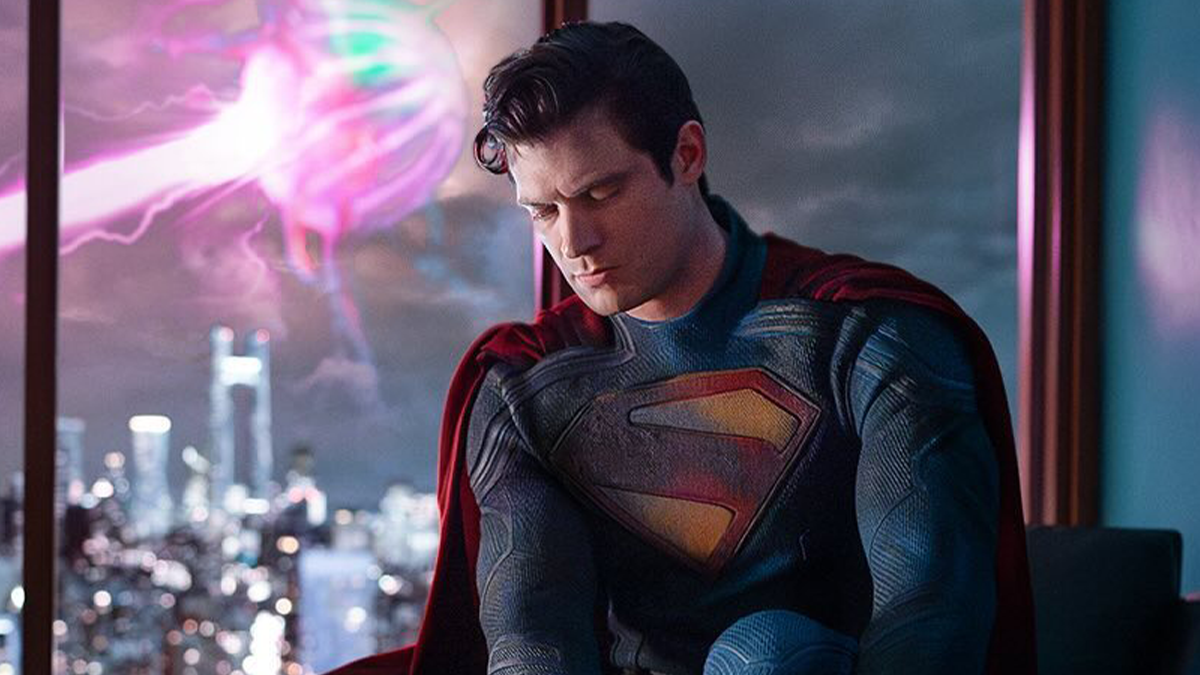Aquaman and the Lost Kingdom Review: A Silly and Suitable Swan Song for the DCEU
The Aquaman sequel succeeds thanks to its free-wheeling attitude and committed ensemble cast.
Much like my experience watching The Flash earlier this year, the opening titles of Aquaman and the Lost Kingdom accidentally encapsulated the film's place in the ever-evolving superhero landscape. Since 2017, the DC fanfare has preempted, with a few exceptions, the majority of the live-action films set within the complicated saga (both on and off screen) that fans know as the DC Extended Universe. It has been pretty safe to assume that Lost Kingdom would be the last time this intro is ever used on the big screen, before James Gunn and Peter Safran's DC Universe introduces a reset canon and a much-needed fresh start in 2025. This makes the noise that accompanies Lost Kingdom's use of the fanfare — a low and messy gurgling sound that almost captures the disarray and uncertainty of the past ten years of DCEU movies — oddly poetic, although not at all by design. In a similar way, even though Aquaman and the Lost Kingdom certainly wasn't designed to be the capstone of its controversial franchise, it proves to be a poetic conclusion, delivering a film that might be just as entertaining as it is messy.
Aquaman and the Lost Kingdom picks up with Arthur Curry / Aquaman (Jason Momoa) several years into his tenure as the King of Atlantis. While balancing the bureaucracy of his job and the unpredictable responsibilities of being a first-time father, Arthur's status quo is shaken up by the return of David Hyde / Black Manta (Yahya Abdul-Mateen II), whose grudge is now bolstered by pieces of dark magic that could ruin both the seas and the surface world. In a reluctant partnership with his estranged brother Orm (Patrick Wilson), Arthur must fight for the safety of the two worlds he calls home — as well as his family on both sides.
2018's Aquaman carved out its place in the fledgling DCEU in a matter that was safe, but admirable and crowd-pleasing. As the film sought to introduce viewers to the long-running and bizarre lore of Atlantis, it drew swaths of inspiration from Geoff Johns' modern-day run on the character, to the point of even folding in the lore of his never-published "The Secret of the Seven Seas" storyline. Aquaman and the Lost Kingdom takes a decidedly different approach, infusing practically every scene with the DNA of its titular character's Silver and Bronze Age comics. As a result, the tone of the sequel is decidedly wacky, in ways that are charming, patronizing, and everything in between. On a visual and structural level, there are new elements of Atlantis' worldbuilding that sound unhinged out of context, but that have genuinely cool implications on the story. For better or for worse, nearly every line of dialogue in Lost Kingdom would slot perfectly into a Silver Age comic — which works wonders in regards to Manta's brash pettiness towards Arthur, or the playful jabs exchanged between Arthur and Orm. It doesn't work as well when emotional beats between Arthur and those close to him devolve into platitudes and obvious lines of exposition, or when story beats take a little too long to get going.
But Lost Kingdom never fully dips towards being exhausting to watch, even though viewers' mileage will probably vary with regards to the obviousness of The Lost Kingdom — whether in its dialogue, its needle drops of music, or the bare bones of its plot. The film even has an odd sense of blatant cultural osmosis on display, with certain sequences clearly trying to evoke beats from already beloved movies like The Thing, Star Wars: Return of the Jedi, and even director James Wan's own work on Furious 7. (Without getting into specific spoilers, the film's final moments also draw obvious comparisons to another superhero film released the same year as the first Aquaman.) But let's be honest — the DCEU's take on Aquaman has always understood the value of not taking yourself too seriously, which was especially impressive amidst the larger franchise's somber and gritty veneer. There is something satisfying about watching it embrace its goofy destiny, forgoing complex character arcs in favor of immediate fun. That being said, Wan does prove to be a master at creating small beats of genuine narrative tension, delivering a handful of jumpscares or perilous situations at much-needed moments. None of those moments within Lost Kingdom even come close to the ambitious and breathtaking stakes of the first Aquaman's scene in The Trench, but they definitely get the job done.
The ensemble cast of Aquaman and the Lost Kingdom takes ownership of the film's veneer, adding just enough of an earnest pathos to the wildest of line reads. As one of the most-recurring performances in the DCEU, Momoa's take on Aquaman is so assured that it's almost a foregone conclusion in Lost Kingdom, as he approaches Arthur with a reliable goofball energy. Wilson's Orm ends up being the standout of nearly every scene he's in — which is unsurprising given his filmography of consistent and clever performances, but it's simultaneously surprising that the film provides him with so much to do. In my screening alone, nearly every audible reaction from the audience was in response to something Orm did, hinting at a level of genuine investment that is still rare for superhero antagonists. Likewise, Abdul-Mateen II chews all pieces of available scenery as Black Manta, perfectly capturing the character's comic-accurate reputation of being hateful and dramatic, without ever becoming unrelatable. Randall Park's Dr. Stephen Shin essentially becomes the fourth main player of the film, and delivers a sensible charm when necessary. Supporting players like Nicole Kidman's Atlanna, Temuera Morrison's Tom Curry, and Amber Heard's Mera (whose role is drastically downgraded from the first Aquaman, but not nearly as much as rumors had suggested) do the best they can with what little they're given, and there are a few other smaller players whose roles (either new or returning) are too good to spoil here.
On an aesthetic and technical level, Aquaman and the Lost Kingdom makes some big swings — and both its successes and its missteps manage to, at the very least, be entertaining to watch. The costuming led by Richard Sale is one of the film's biggest strengths, delivering captivating, yet streamlined new practical costumes for Arthur, Manta, and more. These practical suits, no matter how ridiculous they might look, prove to be essential to ground the actors in the space they're in, especially in some of the CGI-heavy settings. That VFX work is definitely filled with some hits and misses, but the immersion of these ambitious worlds never gets completely broken. That uncanniness could also be a result of me screening the film in a 3D format, a choice that has a few clever gimmicks, but isn't essential to the viewing experience.
Aquaman and the Lost Kingdom is perfectly fine, whether as a showcase of some of its titular character's weirdest lore, the finale to one of the most controversial film franchises in modern history, or an entertaining-enough superhero movie in a landscape that no longer has to rely solely on them. While the film certainly doesn't manage to break new ground, an argument can be made that it doesn't necessarily need to — it's just a pleasant, largely entertaining time with a character whose big-screen portrayal was one of the DCEU's rare successes. Thanks to its free-wheeling attitude and committed ensemble cast, Aquaman and the Lost Kingdom closes a cinematic chapter in a silly, but satisfying-enough way.
Rating: 3 out of 5
Aquaman and the Lost Kingdom will be released exclusively in theaters on Friday, December 22nd.




